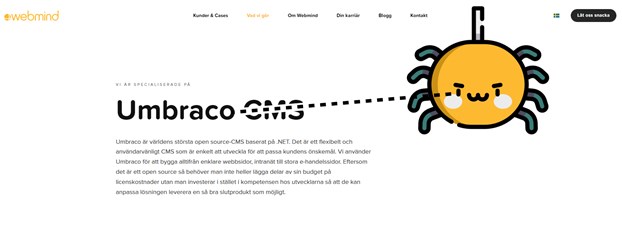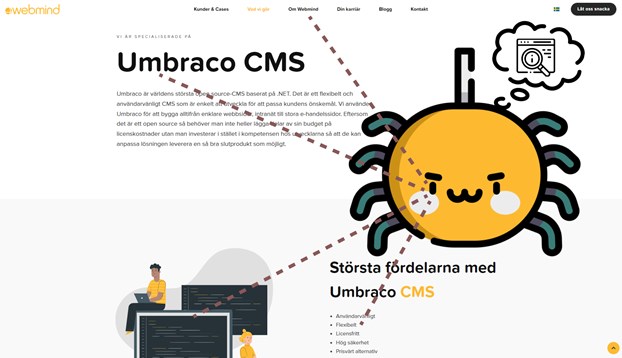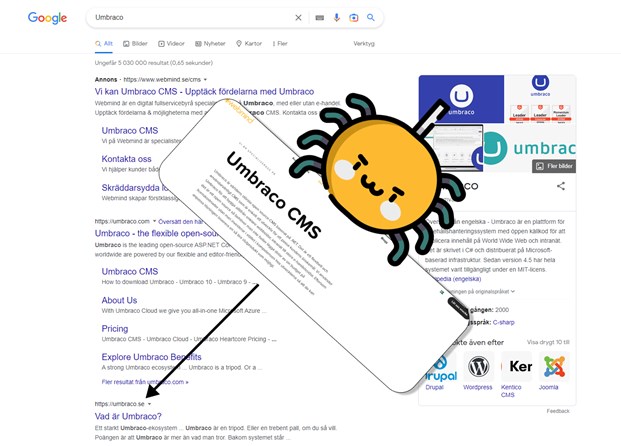What is SEO and how does it work?
If you've found your way in here, you've probably Googled SEO and are wondering what it is - and there's an endless amount to read on the subject. It is no exaggeration to say that the use of search engines is a big part of our everyday life. According to a report from Svenskarna & Internet, 75% of Sweden's population makes searches every day and that says something about the potential that comes with being visible on search engines, whether it's through paid ads or organic search results (SEO) - which is exactly what this blog post is about.
We want to explain here in a simple and concise way what SEO is, what indexing means and why it is important to work with SEO. Our goal is for you to understand the basics and the importance of optimizing for Google.
So, what does SEO mean?
SEO is an abbreviation for Search Engine Optimization. This means that you optimize your web page in various ways so that a search engine will find it relevant and place it as high up in the search results as possible.
So which search engine are we talking about? Google of course. There’s are a variety of search engines and which one is used may be different around the world, in China e.g. Baidu is primarily used, but Google is the largest in the rest of the world with a market share of over 80% - in Sweden a whopping 95% of all searches are made on Google. However, even if you optimize for a specific search engine, it does'nt mean that your website won’t visible to other search engines.
Before we go any further, we want to explain a few concepts to be aware of when talking about SEO:
- Indexing = Indexing is when your website is listed/catalogued by a search engine and can then be seen in the search results.
- Spider = A computer program that automatically crawls links through the internet looking for new web pages to index.
- Crawling = What the spider does - ie following links to find new content.
- Keyword & search phrase = Keyword is the word you search/Google for, e.g. "Umbraco". A search phrase is a combination of keywords such as "What is Umbraco?".
- Search Results or SERP - Short for Search Engine Results Pages, the page where the search results are displayed.
How does Google find your website?
In order for your web page to be visible on Google at all, it needs to be indexed, and this is where the spider comes into the picture. Google sends out its spider, or Googlebot as they call it, which then crawls the page for information and assesses how "good" and relevant it is relative to the search term.

When the spider has found what it needs, it returns to Google's servers and leaves the information and your page gets indexed. To give an example, the search term "Umbraco" is what we optimize for here at Webmind.se, and if the spider has assessed the page as relevant to the search term, it tells Google that our page is about Umbraco in particular. The information is then given a score, depending on how the spider assesses the relevance (as well as other factors that are weighed in), and this determines where in the search results the page is placed. This is usually called "ranking" and the better the rank score, the higher it ends up in the search results.
The spider is very picky and takes many factors into consideration when it decides which position the page will get in the search results. To give some examples:
- What filename the images have
- How well the pictures match the text
- If the page has good enough contrasts between text and background
- Whether headings and other text have the correct HTML tagging (e.g. H1)
- Internal links on the page
- As well as a number of important technical conditionss, e.g. like how fast the site is.

Why is SEO important and how do you work with it?
If you don't end up on the first page of the search results, you are pretty much invisible, because about 75% of all link clicks are made on the first page. Paid ads also end up in the search results, usually at the top, but SEO is only about being seen organically, i.e. non-paid.
There are different ways of working with SEO that can be divided into three categories:
- On-page = Working with the content on the web page. This can be how you handle images, textual content, different tags in the code and how much relevance your material has linked to the keyword.
- Off-page = Getting other web pages to link to your web page, something Google likes.
- Technical = In short, deals with various technical conditions that affect the "spider operation", e.g. source code, loading time, 404 pages, URL redirect management, sitemaps, etc.
Ideally, you should work with all three parts to have the best conditions for ranking well. Working with SEO is extensive and long-term work, but it also gives results. According to statistics, 53% of all traffic on the web comes from organic search results (SEO) and has twice the conversion rate compared to ads on Google. So if you're successful with your SEO, we'd say it's the cheapest form of marketing you can do. Here you can take part in some very interesting and up-to-date SEO statistics.
Google decides
Remember that it’s Google that decides who gets to show up in the search result in the end, working with SEO is about making the content on your website as relevant as possible and having the technical pieces in place to create the conditions to rank well.

As mentioned, there are many ranking factors that come into play and it is not easy to keep track of everything. Therefore, an important condition is an SEO-friendly CMS, where many of the technical parts are in place from the start, a good example of that is Umbraco.
What is the first step to get started with SEO work?
There are many different ways to increase visibility and a higher ranking position in the search results. But the first thing you need to do is consider whether this is something you have the possibility to work on yourself or whether you need to bring in expert help. If you don't see that this is something you can handle yourself, our tip is to find a partner who can help optimize your website.
